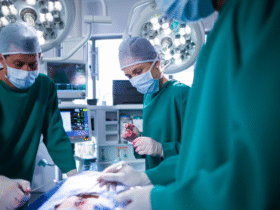Finding a good surgeon is an extremely important step in the medical journey of an individual seeking treatment through surgery. An empathetic and experienced surgeon will enable the patient to feel comfortable and at peace with their condition. Mental assurance is as important as physical well-being.
However, this task often becomes difficult for individuals who do not know where to look. The internet may yield a thousand results but how can one be sure to trust these doctors that they do not have a rapport with? Icareheal is a one-of-a kind platform that connects you to the best doctors near you. For example, you are looking for a General Surgeon in Nellore. Your quest is sure to come to an end with just one click on icareheal.
What is surgery?
Surgery is a medical or dental specialty that employs practical manual and instrumental techniques on a person to investigate or treat a neurotic condition like a disease or accident, to help increase one’s material ability, look, or to cure unattractive cracked areas. Clinical therapy administered through a body orifice is referred to as a medical procedure. Traditionally, this meant creating a large entry point to test the system, but advances in technology now take into account creating a few small cuts (less than 1 centimetre), using tiny tools, and using cameras. A patient could have a medical treatment to: Analyze the condition more thoroughly, obtain a biopsy from a suspect protrusion or eliminate or treat diseased organs or tissues.
Types of surgery
Today’s surgical procedures do not always involve making a huge incision, thanks to technological advancements. There are a number of surgical techniques that can be used, depending on the type of surgery:
– An “open” surgery is one in which the skin and surrounding tissues are cut in order to give the surgeon a clear view of the affected structures or organs. The removal of organs like the gallbladder or kidneys are examples of open surgery.
– The term “minimally invasive surgery” refers to any surgical approach that does not involve making a significant incision. With this relatively new method, the patient can recover more quickly and with less discomfort. Not every medical problem can be treated with minimally invasive surgery.
Who is a general surgeon?
Some operations require specialised surgeons, such as cardiac (heart) or neurosurgeons (brain) surgeons, but not all. There are general surgeons for this reason.
A general surgeon is skilled in every step of the surgical operation, from preoperative planning to actual surgery and postoperative care. A general surgeon is knowledgeable in each of the following nine surgical subspecialties:
– digestive system
– the contents of the abdomen
– the breasts and other soft tissue, such as the skin
– the neck and head
– the heart and blood vessels
– system of the endocrine (hormones and glands)
– the surgical removal of cancer
– Surgery for treating traumatic injuries
– the treatment of seriously unwell individuals who require surgery
Nowadays, laparoscopy and other minimally invasive procedures are commonly used by general surgeons. Smaller instruments, such as microscopic cameras that enable the surgeon to observe what is happening inside your body, are used during laparoscopic procedures. Because of these specialised tools, the surgeon may perform surgeries with considerably smaller incisions than they could with conventional techniques.
General surgeons are well-versed in a wide range of illnesses and disorders. They will provide recommendations regarding whether you require surgery and the best form of surgery.
Surgery of the digestive system
Gastrointestinal surgery is a treatment for illnesses affecting the digestive organs. The oesophagus, stomach, small intestine, large intestine, and rectum are all included. The liver, gallbladder, and pancreas are also included.
A malignant or noncancerous growth or a damaged section of the body, such as the intestine, may be removed through surgery. It can also be utilised to repair problems such as hernias (a hole or weak spot in the wall of the abdomen). Minor surgical treatments are performed to screen and diagnose digestive system issues. It includes surgeries like appendicitis, includes colon cancer and other gastrointestinal cancers, diverticular disease, hernia, inflammatory bowel disease, weight loss surgeries etc.
Surgery related to head and neck
The surgery of head and neck is a vast field which includes many disorders such as thyroidectomy, that is, removal of the thyroid gland. The type and amount of thyroid surgery will be determined by your doctor’s assessment and whether the tumour is benign or malignant (cancerous). The surgeon has significant knowledge in thyroid disease diagnosis and surgery removal. The postoperative treatment and hazards for thyroidectomy differ depending on whether only a piece of the thyroid gland is removed or the complete gland is removed. Patients who have had a partial thyroidectomy experience less post-operative complication.
There are procedures carried out by the surgeon in which they dissect the neck. There are various sorts of neck dissections, and the specific type of surgery depends on your cancer. Neck dissection is sometimes performed on both sides of the neck. The neck dissection is frequently performed in conjunction with other surgeries to remove the original tumour. The main tumour can be located in any part of the head and neck, including the tongue, tonsils, throat, larynx (voice box), or other areas.
Surgery for treating trauma injuries
Trauma surgery focuses on the treatment and management of life-threatening injuries caused by impact forces. There are numerous causes of impact forces, but some of the more common ones are road accidents, falls, sports and crush injuries, and gunshot or knife wounds. Surgeons are appropriately qualified and equipped in most jurisdictions to recognise and treat injuries to the head and neck, abdominal area, chest, legs, feet, arms, and hands. A trauma specialist can see any patient who has suffered a traumatic bodily injury. When patients arrive at the emergency room, they are rapidly screened to determine the degree of their injuries and which are the most dangerous to function and life. If immediate surgery is not required to save the patient’s life, resuscitation and stabilisation are top concerns. This is followed by ultimate surgical treatment.
Most common procedures carried out by General Surgeons
– Fistula Excision
– Sebaceous Cyst Excision
– Sentinel Pile Removal
– Appendicectomy, Laparoscopic or Open
– Cholecystectomy, Laparoscopic or Open
– Invasiveness to a minimum Haemorrhoidectomy (Stapled haemorrhoidectomy)
– Mastectomy with Modified Radical Mastectomy
– Pilonidal Sinus Excision Stripping for Various Veins Gynaecomastia Surgery
Finding The Right Surgeon
If the patient is psychologically calm and composed, the treatment process becomes much easier and smoother. Doctors and surgeons play an important role in this. After a condition has been diagnosed and a surgical procedure has been prescribed, the next critical step is to find a surgeon in whom you have complete confidence.
How do you know if a particular surgeon is the best fit for you? A good surgeon should be able to offer their patients comprehensive care that is tailored to their specific needs.
High intellectual potential, excellent communication skills, courage, and honesty are essential. A good surgeon should be a leader who can accurately assess strengths and weaknesses.
About icareheal
Icareheal is a doctor’s app that features two-way communication for both doctors and patients. It provides a platform for doctors to interact with their patients and build relationships with them through an online clinic. On the other hand, it offers patients a one-click solution for quickly finding the best doctors in their area.














